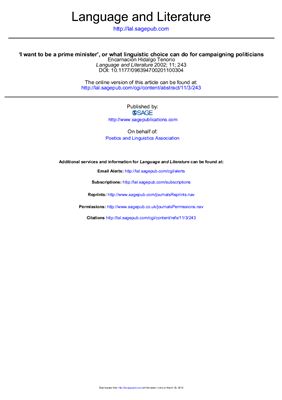The aim of this article is to analyse the strategies that
politicians can use in order to
defeat their political adversaries. To this end, I have put some ideas developed by
discourse analysts to the test, taping some of the speeches, interviews and debates of the
2000 electoral campaign in Andalusia (Spain), scrutinizing the four main candidates’
most significant discursive devices and paying special attention to the way they interact
with each other, their interviewers and the audience in their political meetings. In this
way, I have tried to see whether their different political persuasions may produce a
characteristically different distinctive linguistic style, whether gender might influence
their choice of discourse structures, and the extent to which the winning candidate’s
linguistic idiosyncrasies might have contributed to his success.
defeat their political adversaries. To this end, I have put some ideas developed by
discourse analysts to the test, taping some of the speeches, interviews and debates of the
2000 electoral campaign in Andalusia (Spain), scrutinizing the four main candidates’
most significant discursive devices and paying special attention to the way they interact
with each other, their interviewers and the audience in their political meetings. In this
way, I have tried to see whether their different political persuasions may produce a
characteristically different distinctive linguistic style, whether gender might influence
their choice of discourse structures, and the extent to which the winning candidate’s
linguistic idiosyncrasies might have contributed to his success.

